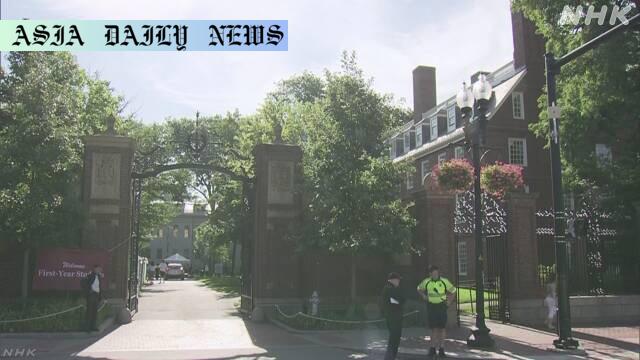Harvard will face tax-exempt status cancellation, causing financial uncertainty for higher education and student aid.
Trump announces plans to revoke Harvard’s tax-exempt status.
Cites failure to protect Jewish students from antisemitism.
Harvard warns of financial aid consequences, challenges legality.

Introduction: A Bold Administrative Move
In a significant move targeting one of America’s most prestigious institutions, US President Donald Trump announced plans to revoke Harvard University’s tax-exempt status. This decision stems from allegations tied to the university’s purported failure to address antisemitism on campus and has sparked a flurry of debates nationwide. Trump has further revealed that the move follows a federal funding freeze earlier this year, cementing his administration’s stance on holding institutions accountable for perceived shortcomings. The announcement has set off concerns regarding the potential ramifications on education, funding, and the broader implications for policies affecting higher education institutions.
Background: Federal Freeze and Legal Challenges
The conflict between the Trump administration and Harvard University began earlier in 2023, when federal funding was partially frozen. According to the administration, Harvard allegedly failed to protect Jewish students from antisemitism, a claim that the university has strongly contested. Harvard has since filed a lawsuit against this measure, emphasizing the lack of legal grounds for such actions. However, Trump’s subsequent decision to pursue the revocation of the university’s tax-exempt status takes the battle to an unprecedented level. Legal experts and Harvard representatives warn that such action could set a dangerous precedent, potentially jeopardizing financial aid programs and negatively affecting students nationwide.
Potential Ramifications on Harvard and Higher Education
The potential revocation of Harvard’s tax-exempt status has far-reaching implications. One immediate concern is the financial strain on students who rely on the university’s extensive aid programs. Harvard’s endowment, partially bolstered by its tax-exempt status, plays a crucial role in funding scholarships, research initiatives, and other educational programs. Without this tax-exempt status, the university may face challenges in maintaining its commitment to accessibility and affordability. Additionally, this decision could set a contentious precedent for other institutions, provoking uncertainty in higher education funding frameworks across the country.
Harvard’s Response: Legal Crossroads and Public Defense
In response to Trump’s latest announcement, Harvard has released a statement asserting the lack of legal basis for revoking its tax-exempt status. The university has emphasized that proceeding with such action would harm students, diminish its contributions to research, and disrupt the broader higher education landscape. As critics and supporters of the Trump administration argue about the motivations behind this decision, Harvard remains poised on a legal battleground, citing constitutional protections and the potential consequences of what it calls “unprecedented action.”
Broader Implications on Higher-Education Policies
The Trump administration’s move has implications that extend well beyond Harvard. While the specific focus is on alleged antisemitism, critics warn that targeting institutions for perceived political or ideological reasons risks undermining academic freedom and autonomy. Tax-exempt status is a core financial tool for nonprofit universities, enabling them to provide accessible education and contribute to societal progress without excessive financial burdens. Revoking such privileges could hinder universities from meeting their social obligations or achieving their academic missions, complicating the dynamics between the federal government and educational institutions.
Conclusion: A Defining Moment
The decision to revoke Harvard University’s tax-exempt status represents a historic and controversial moment in the intersection of politics, education, and policymaking. While the Trump administration argues for accountability, institutions like Harvard warn of dangerous precedents and far-reaching negative implications for students, research, and the country’s global academic standing. As this dispute unfolds in courts and public discourse, it stands as a defining moment that could reshape the framework for federal and institutional relationships in higher education.



Commentary
Introduction: A Controversial Presidential Decision
President Trump’s announcement regarding the revocation of Harvard University’s tax-exempt status is undoubtedly one of the more controversial moves in recent political history. The decision raises critical questions about the government’s role in influencing academic and financial policies at major institutions. While holding organizations accountable is important, the underlying motivations and consequences of such decisions warrant deep scrutiny.
Balancing Accountability and Fairness
On one hand, the Trump administration’s focus on combating alleged antisemitism and encouraging accountability in higher education is a commendable goal. However, addressing such issues with sweeping financial penalties seems disproportionate and potentially harmful to student beneficiaries. There must be a balanced approach that ensures institutions prioritize inclusivity and accountability without jeopardizing their financial and academic missions. Revoking tax-exempt status may do more harm than good, especially for students relying on financial aid.
The Precedent Dilemma
Another critical concern is the precedent such an action could set for other academic institutions. If tax-exempt status can be revoked over policy disagreements or isolated incidents, universities may find themselves walking a tightrope of continuously altering policies to satisfy political agendas. This could detract from their primary mission of providing quality education and conducting groundbreaking research. Furthermore, such measures might discourage long-term investment in higher education, given the risks associated with fluctuating governmental oversight.
Conclusion: A Time for Thoughtful Policymaking
Ultimately, while the intent behind Trump’s decision may align with certain values, the execution risks undermining the autonomy and effectiveness of higher education in the United States. Policymakers must tread carefully to ensure that efforts to improve accountability do not inadvertently harm the students and faculty they aim to protect. Constructive dialogue and collaboration are paramount to achieving meaningful and lasting solutions. Harvard’s situation emphasizes the importance of fairness, foresight, and public interest in governmental decision-making.